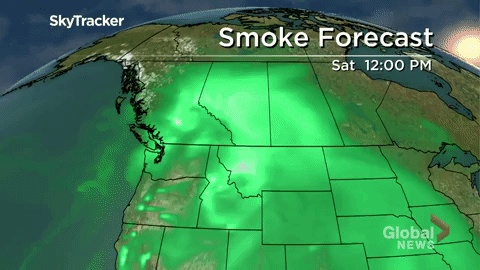With Saturday highs of 25 C in Regina, it may be tempting to head outside and enjoy one of summer’s last gasps this weekend, but health experts say incoming west coast wildfire smoke could leave you gasping as well.

“Generally speaking, it’s best to stay indoors. You definitely don’t want to be doing anything that will increase your respiratory rate such as exercising,” said Saskatchewan Lung Association nurse Jill Hubick. “Particles of smoke are really small. Dust and cloth masks, for example, won’t protect you from smoke.”
The recommendation comes as weather experts predict smoke from wildfires in the northwest U.S. will soon settle over the prairies.

“We’ve got a cool upper trough rolling in and there’s cooler air aloft. Because colder air is denser it will sink down to the ground and I think it will bring some of that smoke along with it. So it looks like the air quality will begin to deteriorate on Sunday,” Quinlan said.
Quinlan says changes in wind direction and rain are the main mechanisms for clearing smoke from a region. He says southern Saskatchewan could see both on Sunday.

Get weekly health news
“I think, really, it’ll be the change in wind direction that we do see as we head into early next week that will push that smoke down to the south across the border into the United States,” he added.
Hubick said that health hazards can begin when inhaling any level of wildfire smoke with the potential of negative effects getting more serious from there.
“In general the public will experience things like headaches, runny nose, irritated eyes, and worsening of allergies,” she said. “Those with lung diseases such as asthma or COPD – this can be a trigger for them and lead to an emergency, flareup or lung attack which requires immediate medical attention.”
Hubick said it’s especially important for those with compromised lungs to take their medications, but said that the respiratory system isn’t the only part of the body at risk.
“Forest fire smoke causes an inflammatory response. It can also impact the heart,” she said, adding that the young and old are most at-risk.
“Children have smaller airways, and smaller lungs and as a result have a faster respiratory rate. As a result of that, they’re breathing faster and taking in more smoke. Older adults tend to have the disease so we want to make sure that we’re protecting those populations as much as possible.”
She said that precaution is also important because of the pandemic.
“If you are going to contract COVID-19, you don’t want to be in an already compromised state.”
Hubick reiterated that the best defense against wildfire smoke is to stay indoors, ensure doors and windows are tightly closed, and to put your air conditioner on a re-circulation setting if you have one.




Comments